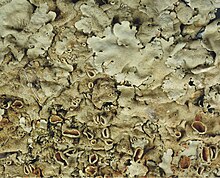Parmelinella is a genus of lichen belonging to the family Parmeliaceae.[1] The genus was circumscribed in 1987 by John Elix and Mason Hale as a segregate of Parmelina, from which it differs in having larger ascospores and containing salazinic acid.[2] Although the genus had been assumed to be well-defined morphologically, a 2021 molecular phylogenetic study suggests that the generic delimitations need to be revised.[3]
| Parmelinella | |
|---|---|

| |
| Parmelinella schimperiana | |
| Scientific classification | |
| Domain: | Eukaryota |
| Kingdom: | Fungi |
| Division: | Ascomycota |
| Class: | Lecanoromycetes |
| Order: | Lecanorales |
| Family: | Parmeliaceae |
| Genus: | Parmelinella Elix & Hale (1987) |
| Type species | |
| Parmelinella wallichiana (Taylor) Elix & Hale (1987)
| |
Species
edit- Parmelinella afrocetrata (Elix, Eb.Fischer & Killmann) Marcelli & A.A.Spielm. (2020)
- Parmelinella chozoubae (Kr.P.Singh & G.P.Sinha) Elix & Pooprang (1999) – Asia
- Parmelinella cinerascens (Lynge) Benatti & Marcelli (2012)[4] – South America
- Parmelinella inexplicabilis Marcelli & C.H.Ribeiro (2002)
- Parmelinella manipurensis (Kr.P.Singh) Elix & Hale (1987)
- Parmelinella mutata (Vain.) Benatti (2014)[5] – South America
- Parmelinella nimandairana (Zahlbr.) Benatti & Marcelli (2014)[5] – Africa; Asia
- Parmelinella salacinifera (Hale) Marcelli & Benatti (2014)[5] – North America; Central America; South America; Caribbean islands; Thailand
- Parmelinella schimperiana Kirika & Divakar (2016)[6] – Kenya
- Parmelinella simplicior (Hale) Elix & Hale (1987) – Africa; Asia
- Parmelinella versiformis (Kremp.) Marcelli (1993) – South America
- Parmelinella wallichiana (Taylor) Elix & Hale (1987) – Africa; Asia; Australia; South America
References
edit- ^ Lücking, Robert; Hodkinson, Brendan P.; Leavitt, Steven D. (2017). "The 2016 classification of lichenized fungi in the Ascomycota and Basidiomycota–Approaching one thousand genera". The Bryologist. 119 (4): 361–416. doi:10.1639/0007-2745-119.4.361. S2CID 90258634.
- ^ Elix, John A.; Hale, Mason E. (1987). "Canomaculina, Myelochroa, Parmelinella, Parmelinopsis and Parmotremopsis, five new genera in the Parmeliaceae (lichenized Ascomycotina)". Mycotaxon. 29: 233–244.
- ^ Rodrigues, Andressa S.; Canêz, Luciana S.; Lorenz, Aline P. (2021). "Canoparmelia amazonica, Myelochroa lindmanii and Parmelinella salacinifera belong to Parmelinella (Parmeliaceae)". The Bryologist. 124 (3): 352–361. doi:10.1639/0007-2745-124.3.352. S2CID 237773315.
- ^ Benatti, Michel Navarro (2021). "Canoparmelia cinerascens belongs in the genus Parmelinella (Parmeliaceae, lichenized Ascomycota)". Opuscula Philolichenum. 11: 26–30.
- ^ a b c Benatti, M.N. (2014). "An update on the genus Parmelinella Elix & Hale (Parmeliaceae, lichenized Ascomycetes)". Mycosphere. 5 (6): 770–789. doi:10.5943/mycosphere/5/6/8.
- ^ Lumbsch, H. Thorsten; Kirika, Paul M.; Divakar, Pradeep K.; Crespo, Ana; Mugambi, George; Orock, Elizabeth A.; Leavitt, Steven D.; Gatheri, Grace W. (2016). "Phylogenetic studies uncover a predominantly African lineage in a widely distributed lichen-forming fungal species". MycoKeys. 14: 1–16. doi:10.3897/mycokeys.14.8971.